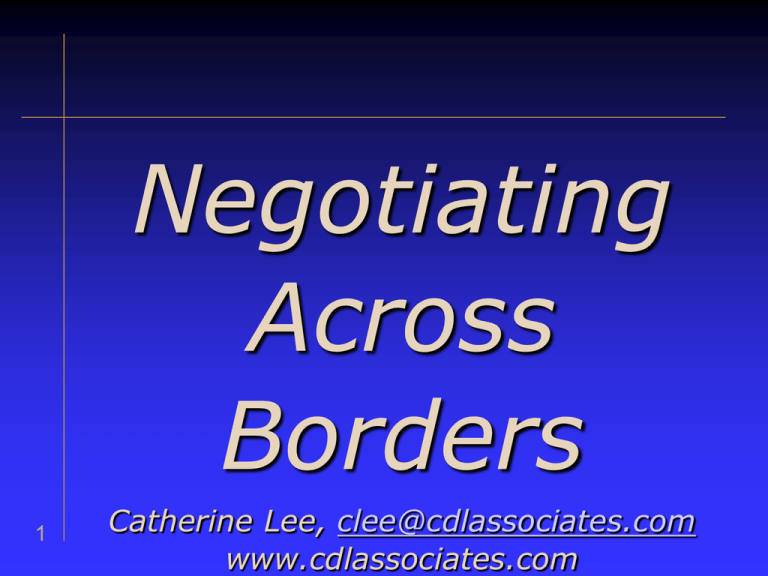Negotiating Behaviors
advertisement

Negotiating Across Borders 1 Catherine Lee, clee@cdlassociates.com www.cdlassociates.com Objectives 2 To present a process for preparing a negotiation To delineate the impact of behavior on outcome and how to manage your behavior to influence across cultures. Harvard Business Review “If you don’t negotiate for your salary, they walk away happy that they paid you less, but wonder why they hired you.” — Hannah Riley Bowles and Kathleen McGinn 3 Power “All power is based on perception. If you think you’ve got it, then you’ve got it. If you think you don’t have it, even if you have it, then you don’t have it.” 4 — You Can Negotiate Anything, Herb Cohen Trust TRUST = CONFIDENT EXPECTATIONS What builds Trust? 5 Trust 6 Two Essential Ingredients for Initiating TRUST VULNERABILITY CONSISTENCY Influence How can you move someone in your direction? 7 Perspective Taking— Whose Point of View Motivations Questioning: What, How, and Why? Needs 8 Options Getting the Mandate: The Negotiation Process External Negotiation Validate Needs and Wants Manage Behaviors Maintain Collaborative Climate Secure Agreement Internal Negotiation Plan/ Strategize Collect Data 9 Get Mandate Need Sell Agreement to Mandate Team Implementation Process for Preparation of a Negotiation Five Steps in the Preparation Process 1. Determine the objective 2. Identify and rank the issues – yours and theirs 3. Set the parameters 4. Develop your strengths 5. Brainstorm alternatives 10 1. Determine the Objective 11 Expectations of outcome — What will you walk away with? Specific results needed Short term results placed in long term plan 2. Identify and Rank Issues 12 List all issues Assign priorities to issues Determine which are negotiable and which are non-negotiable Decide which are “musts” vs. “wants” Identify other party’s issues and priorities 3. Set Parameters Determine range vs. fixed target Best 13 Target Worst Where to start When to walk or close Fixed Target Aspiration Levels Is there a relationship between aspiration levels and success? 1. Finding: Persons with higher aspiration levels won awards. 2. Finding: Skilled negotiators with high aspiration levels were big winners regardless of whether they had power. 14 Aspiration Levels (Cont’d) 3. Finding: Persons with high aspirations were winners in every case where they opposed low aspirants. It did not matter if they were unskilled or had less power. — The Negotiating Game, Dr. Chester L. Karass 15 Russian Proverb “There are two fools in every market: One asks too little, one asks too much.” 16 4. Develop Your Strengths You benefit from knowing your own strengths by being able to: Offer viable options. Know what concessions can be made. Leverage better for what you need. Strategically plan timing, order of priority, and concessions. 17 5. Brainstorm Alternatives 18 As many alternatives as possible Brainstorm options for each issue Valuable to other side Power in number of alternatives “The Art of War” by Sun Tzu First Rule Second Rule 19 Avoid War Offer Options Logic Is Not Persuasive 20 Behaviors in Negotiating Behaviors Motives Intentions Beliefs Perceptions Attitudes Personality Feelings 21 Observable behaviors— what a person says and does— reveal only 10% of who that person is. Negotiating Behaviors: Creative Problem Solving Interpersonal Impact Open & Honest Increases Clarity Express Feelings Irritates Antagonizes Business Impact Negotiating Behaviors Behavior Alert Indicate Disagreement Rankle Attack Increases Risk Seen as Unwilling 22 Counter Stalls Negotiation Reduces Trust Reason Overload Builds Trust Creates Open Climate Less Chance to Agree Complicates Influencing Behaviors: Valuing Differences Interpersonal Impact Influencing Behaviors Perceived Interest in Others Ask Clarify More Harmony Better Solutions Acknowledge Listening Reinforcement Probe Business Impact Reduces Error Improves Quality Summarize Builds a Foundation for Trust 23 Build Behavior Alert Maintains Relationships Behaviors to Use and Avoid Avoid Use Requesting Information Expressing Feelings 24 Clarifying and Summarizing Behavior Alert (Except Disagreeing) Ranklers Counters Attacking Reason Overload Building Model Options for handling ideas: Suggestion Yes Agree No ? Support 25 Disagree Building Model Options for handling ideas: Suggestion Yes Agree No ? 26 Support Disagree Build Counter Building Model Options for handling ideas: Suggestion Yes No Agree ? Find Flaw Support Disagree Patch Flaw 27 Build Counter John Wayne is Dead 28 Most Difficult Negotiators Our Side and their side Straightforward vs. Silent Types Empathy with questions. Value the difference Recommended Reading The New Rules Of International Negotiation: Building Relationships, Earning Trust, And Creating Influence Around The World 29 Catherine M. Lee











